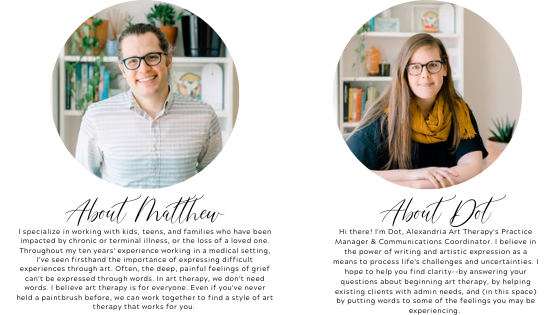What Are Your Frustrations Trying to Tell You?
When you’re throwing pottery, your frustration takes the shape of a lump of mud.
Art Therapist Matthew Brooks says, “One of the first steps to throwing clay is to center the clay on the wheel. If the clay isn’t centered, then the piece will be unbalanced or will fail. At times, I struggle to get the clay centered, even though I’ve centered hundreds of pieces before. My teacher told me when I first started that if you’re struggling to center the clay, then maybe you aren’t centered, yourself. I step back and have to check in with myself--am I centered? It can be really frustrating and difficult when you’re pushing the clay, trying to make it centered, and just not getting it.
“This is so comparable to what we experience in life. We aren’t centered, something is wrong, and we keep pushing and pressing to try to keep everything in our lives centered. We get so frustrated at the smallest things, when really something else is going on that we need to see. These frustrations can be a warning bell alerting us of larger things happening. How can we learn to recognize these notifications?”
What are your frustrations trying to tell you?
RECOGNIZING FRUSTRATIONS AS ALARM BELLS
I once had a meltdown at an airport employee when he told me I couldn’t take my external battery charger on a flight from Riyadh to London. It was not my finest moment. Did I like and use that battery charger? Yes. But I had owned it for years! It was super out of date. I could have just bought a new one when we landed at Heathrow.
The battery charger was a breaking point. The real problem was that living in Saudi Arabia made me very stressed. I needed a break from missile strikes and an environment where, as a woman, driving was illegal, and I had to wear a long black abaya over my clothes in the 120-degree heat. The battery charger? Just an alarm bell.
How, in the moment, do you hear the alarm bells going off? Well, first, look around you. If the people at your airport gate are looking at you, then each other, then backing up slowly, it could be that the problem is not actually external. Try to center yourself enough that you can measure whether your frustration is eliciting an outsized reaction. Or try to identify if your frustration is the result of repeating the same pattern of behavior while expecting different results.
Of course, other people treating you like you’re unhinged isn’t always a good indicator, especially in this age of gaslighting, where we’re often encouraged to downsize reactions that are justified. Another way to see if this is a real problem or just an alarm bell is to try to connect your direct frustration with your values.
Do you really care about the ability to throw a perfect pot on the first try? (Or does the practice of working with clay mean more to you than that?)
Do you really value the small item being confiscated by someone who is just following orders? (Or is this about systems that are way beyond the airport employee’s control?)
As the adage goes: is this the hill you want to die on? Does it point you to anything you do value, instead?
HOW DO I CENTER MYSELF IN THE MOMENT?
When you’re centering clay on the wheel and it’s just not going well, increasing the speed of the wheel isn’t going to help you. When you’re encountering a frustrating situation (especially one that you sense might be about something bigger), slow down. Stop trying to make the thing happen.
In a moment of extreme frustration, you will need to calm your nervous system before you can begin to identify what’s truly going on. Take a few deep breaths. Do a body scan and notice where you are holding stress or tension.
“Noticing the sensations in the body can provide an opportunity to tune in to an emotional experience,” says clinical director Adele Stuckey. “If I feel hot vibrations in my chest, I might be feeling irritated. If there's a heavy weight on my shoulders, it might be grief or sadness. Noticing my physical state is a cue for my emotional and physical needs. Am I longing for connection, expression, a discharge of energy, or am I in need of some physical self soothing?”
As you identify sensations in your body, you might try to move a little and see if they release. Have a snack and a cup of tea or a glass of cold water. Make sure your basic physical needs are being met.
If possible, step away and get some rest, or even a night of sleep. If your problem is solvable, chances are a new, creative solution isn’t going to pop into an exhausted brain.
IT’S NEVER ABOUT THE GROUT
If I had to claim a specialization, it would be in culture shock and adjustment. My partner works for the U.S. State Department, and his job is the reason I was living in Saudi Arabia. There, as well as in Qatar, our second assignment, I worked in the U.S. Embassy office that helped new arrivals transition to post.
Moving, especially to a different country, can be traumatic. You are losing everything familiar that once structured your life (your friends, proximity to family, your house, your favorite grocery items) only to be thrust into a new situation with all new people, a new language, and likely some very different driving norms.
So it wasn’t uncommon for a new arrival to show up in my office with a huge crisis like this one: the grout in the floor of my government-assigned home is filthy.
The property manager sent cleaners. It wasn’t good enough.
The Embassy office contracted different cleaners. It wasn’t good enough.
The family put in a request to move to a different house, but first they wanted to see the new house’s grout, just to make sure.
“I think we could really be happy here if it weren’t for this GROUT!” they’d say.
But of course, it’s never about the grout. The grout is an external thing you think you can fix when the rest of your life is unfixable. You can’t fix the fact that you’re in a new country and don’t know which way is up. You can’t fix the fact that you don’t have established relationships here yet, or that you’re worried about your kid adjusting to school or that you don’t feel safe. But the grout! The grout is a tangible problem. You can’t yell at someone about your culture shock adjustment, but you can definitely complain to management about the grout!
It helps, when a small frustration starts to take over your life, to be kind to yourself about any transitions you may be going through. Have you recently moved? Started a new job? Become a parent? Lost someone close to you? Oh, wait, is it still a pandemic? You’re in transition.
LIFE INVENTORY
Sometimes, acknowledging that you’re adapting to a life transition is enough to explain your frustration alarm bells and “dismiss notification,” if you will. But what if that’s not it? It may be time for a life inventory.
Resentment at your partner/coworker/family member could indicate you’re not getting your own needs met.
Irritation that people don’t respect you could indicate that you’re not clearly communicating your boundaries.
Jealousy at someone else’s life could mean that it’s time to make a hard change you may have been putting off.
Frustration about other people’s behavior may be a clue that you wish you had more control over aspects of your own life.
Sometimes it’s easy to take a step back and get to the root of the problem. Other times, it helps to bounce your frustrations off a member of your inner circle. Whether that’s your therapist or a close friend who can be trusted to speak the truth, sometimes a little outside perspective can be all it takes to figure out what might help.
If you’ve been considering art therapy, Matthew Brooks is currently accepting new clients. Email us at info@alexandriaarttherapy.com to schedule a free 15-minute consultation, and you can begin to work together on ways to better center your life.


